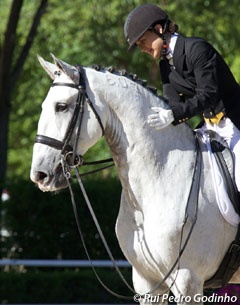
Nuno Oliveira used to say that "it is not the audience that we must impress and seduce, but, quite to the contrary, the horse." You know that feeling you get when you watch a truly brilliant dressage pair. Those goosebumps, the I can’t take my eyes off them-feeling that makes you realise what this sport is really all about.
If you ask yourself what makes these pairs stand out it’s not the flash or the activity. It’s seeing a horse that just loves to do it, a horse with a mind that wants to impress his rider, because the rider has earned the horse's trust and respect! It takes a very special type of rider to foster this relationship, but it also requires a horse with a mind that wants to learn, that loves to please; a mind with sensibility and a dash of humour.
I have had many horses throughout my life and while physical talent and conformation are important, the mind of the horse can be what determines if the horse will make it or not. You can have a horse that is strong, with fantastic gaits, and a talent for collection, but if he doesn’t want to do it, if he is always distracted, if he dislikes people, then you may find it impossible for him to produce what he has there. Alternatively, you may have a horse who is physically not ideal, who has weaknesses in some parts of his work, and who is not naturally talented. Yet, he may make it all the way because he has a work ethic and a mind set, that says “yes I will try!”
When asked just how important the mind of the horse is in the sport of dressage, O-judge Stephen Clarke replied that for top level, regardless of the discipline, be it dressage, show jumping, etc, the right sort of temperament is vital.
“We need brave forward thinking horses that 'want to go' and yet are calm enough to be able to show relaxation as well as full power when needed,” Stephen told Eurodressage.
Forward thinking, yet calm, relaxed, yet sensitive. This kind of cocktail is difficult to achieve and to find, and the mind of the horse must allow for all four to be in play at once.
“Backward thinking horses can be persuaded to do the job up to a point, but normally when the pressure is on they can let you down,” Stephen added.
Having judged, ridden and trained numerous top quality dressage horses, Stephen knows that brave, forward thinking horses, even if they are a little hot, may take some time to settle and accept the various artificial environments that we put them in. In the end, “when the going gets tough, the tough get going!”
If a horse is physical challenged, but has an eager mind, Stephen feels that he can overcome those hurdles to a certain degree.
“It is possible to become pretty successful with big hearted horses that maybe are not blessed with huge athletic ability. In the end however, the top top horses will need to have incredible mental and physical abilities in order to win as we are seeing the bar being raised higher and higher from year to year,” said Stephen.
If Clarke was asked to choose, he would always be happy to work with a horse that could be considered 'difficult' because it was on the hot side, especially if it was blessed with super paces.
Well known German eventing champion and Grand Prix dressage rider Ingrid Klimke is certain that the willingness of the horse is the key to it becoming a true star!
“If a horse has physical hurdles, but a mind that wants to work and is brave, he can for sure overcome many hurdles," Klimke acknowledged. "If he really tries hard for you and is worked correctly, this combination will often allow him the chance to develop the right muscles in order to overcome those physical hurdles."
However, if Ingrid had to choose between a horse with super paces and difficult mind, and a horse with less movement but a very willing mind, she would choose the former.
“I would choose the better paces but make sure that I work to understand his mind and develop within him a positive attitude for dressage!”
Ingrid Klimke is of course a rider who has the experience and ability to help the horse develop mentally in the right way. This is where we as riders need to be honest with ourselves about our own capabilities. Ingrid and Stephen both agree that they would personally choose paces over the mind, but there is only a small percentage of riders who have the ability and mind themselves, to cope with this sort of horse.
I wonder, as a trainer, would you advise your students to choose a horse with a better mind if you knew they were limited as a rider? Would you advise them to select a horse based on temperament if you knew they didn’t have the balance and patience to train a horse with exuberant paces? Is one of the problems with our sport that riders are biting off more than they can chew, and in the end it’s the horse that suffers?
Know yourself and choose a horse that suits you!
by Sarah Warne - Photo © Rui Pedro Godinho